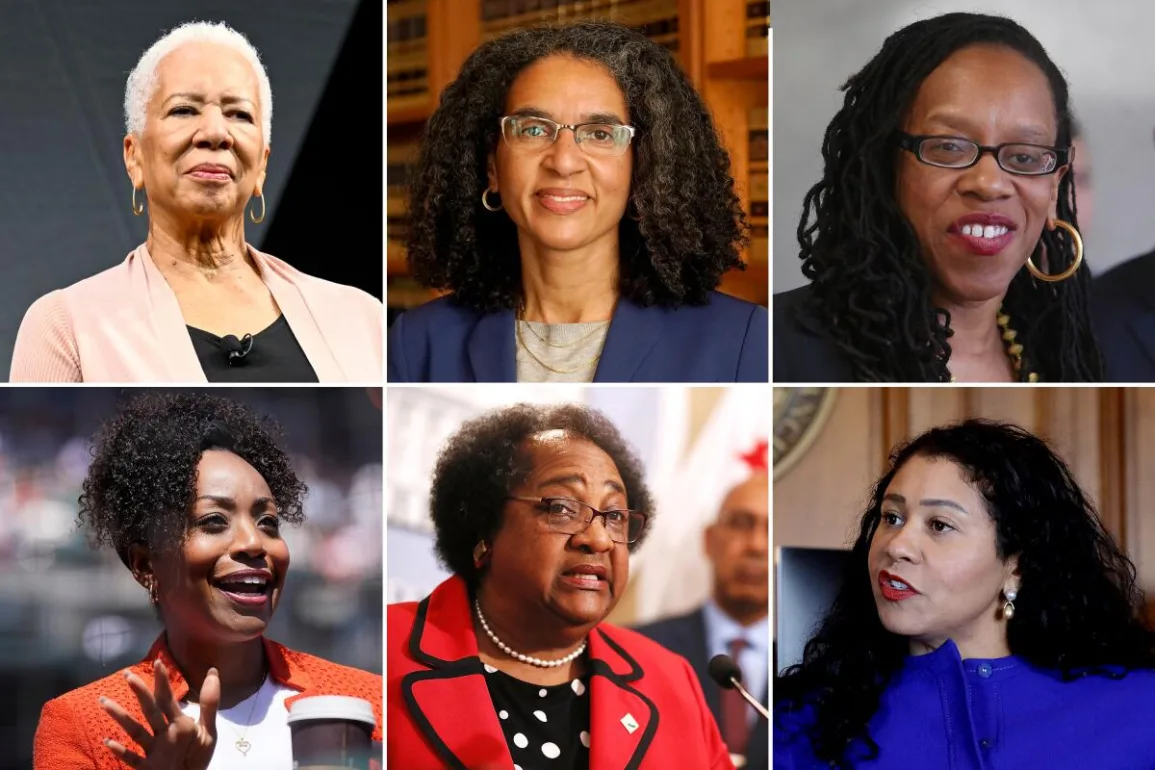Gov. Gavin Newsom spent the past few days as one might expect, privately grieving his “dear friend” Sen. Dianne Feinstein as “a lifelong mentor and a role model not only for me, but to my wife and daughters.”
But sooner rather than later, he’ll have to re-emerge and deal with the political mess that he’s made for himself — and when he does, there will be a lot of unhappy Black people waiting for him.
Newsom is under the delusion that there’s a sizable pool of powerful Black women in California who are eager to put aside their own political ambitions and break ranks with the sisterhood to accept his offer to serve as an “interim appointment” to the Senate. This caretaker would agree to merely finish out Feinstein’s term and not run again — and make it harder to ensure there’s a Black woman in the upper chamber at all.
Who wouldn’t want that?
In fact, the idea that some Black woman would seems to be something of a mass delusion.
Following Feinstein’s unexpected death in Washington, only hours after casting what no one knew then would be the last vote of her trailblazing career, everyone now wants to know: Whom is Newsom going to pick?
California Secretary of State Shirley Weber perhaps? San Francisco Mayor London Breed?
Los Angeles Mayor Karen Bass or L.A. County Supervisor Holly Mitchell?
Rep. Sydney Kamlager (D-Los Angeles), Rep. Maxine Waters (D-Los Angeles) or State Controller Malia Cohen?
Why the governor seems to believe any of these Black women — or the others on his short list who I can only assume are equally accomplished — would settle for being a lame duck in the Senate, I have no idea. But this is essentially what he told Chuck Todd on NBC’s “Meet the Press” in early September.
“I don’t want to get involved in the [March] primary,” Newsom said, referring to the race to succeed Feinstein after she announced that she wouldn’t run for reelection.
Reps. Katie Porter (D-Irvine) and Adam B. Schiff (D-Burbank) have been polling far ahead of Rep. Barbara Lee (D-Oakland), the only Black woman running. That’s why giving her the appointment — and the advantage of incumbency — would be “completely unfair.” Or so the story goes.
A recent poll from UC Berkeley found that 51% of Californians believe Newsom should appoint someone who is prepared to run in 2024. Only 25% said he should choose an interim appointee.
“That primary is just a matter of months away,” Newsom explained. “I don’t want to tip the balance of that.”
It was an unexpected caveat to the promise he made to MSNBC host Joy Reid back in March 2021, when asked whether he would pick a Black woman to replace Feinstein if she were to resign.
“I have multiple names in mind,” Newsom said confidently. “We have multiple names in mind — and the answer is yes.”
This, of course, was back when the wrath of a national coalition of Black politicians, lobbyists, activists and academics was still fresh on his mind.
For months in late 2020, they cajoled and outright demanded the governor “keep the seat” by appointing another Black woman to the Senate to replace Kamala Harris, who had been tapped to be vice president. The coalition wanted Lee or then-Rep. Bass.

Possible appointees to fill the late Sen. Dianne Feinstein’s seat include clockwise from top left: Angela Glover Blackwell, Judge Leondra Kruger, Lateefah Simon, San Francisco Mayor London Breed, Secretary of State Shirley Weber and California State Controller Malia Cohen.
(Los Angeles Times)
Instead, Newsom appointed Alex Padilla as California’s Latino U.S. senator.
Since then, many in the sisterhood — not to mention the brotherhood — have harbored something of a compounding grudge against Newsom. This is true even though Newsom appointed Weber to replace Padilla in a move than many considered a consolation prize.
The bottom line is the Senate still doesn’t have a single Black woman as a member, even though we are the most loyal voting bloc in the Democratic Party.
“This is our seat,” Weber told me in 2020, lamenting how hard and how expensive it is for Black women to win statewide positions. “We have fought to get the seat, and there was a reason why we fought for the seat. And we should not have to justify it.”
Three years later, and it seems Newsom has deluded himself into believing that the powerful Black women in his midst who wanted that seat will take another consolation prize. And that it won’t have any repercussions for him when — not if — he runs for president and needs the support of Black voters in other states.
Breed spoke to this on CNN on Friday night.
“Whomever he appoints — which I know that the governor made a commitment to appoint an African American woman to serve in that role — my hope is that person decides to run for office,” she said. “I don’t support the idea of a caretaker. I do think that we need someone in that role who understands what it means to be courageous, similar to Dianne Feinstein.”
Similarly, Weber told the New York Times on Friday that she doubts she would want to serve in a time-limited office.
“I never take anything in which I don’t think I can make a difference, and being a senator for a year, I probably couldn’t accomplish an awful lot,” she said. “I do know that all the African American women in the state would love to have an African American senator, not just for a year but for a full term.”
Waters similarly shot down the idea on Friday afternoon, telling my Times colleague Erin Logan that she had no interest in being a temporary successor to Feinstein.
“Absolutely not,” she said.
Or as Lee put it after Newsom’s appearance on “Meet the Press”: “The idea that a Black woman should be appointed only as a caretaker to simply check a box is insulting to countless Black women across this country who have carried the Democratic Party to victory election after election.”
So for now, much to what I’m sure is Newsom’s annoyance, many of the Black women he might ask to be a caretaker are lining up behind Lee.




Sen. Dianne Feinstein in 2017.
(Irfan Khan/Los Angeles Times)
Breed: “I think Barbara Lee is an extraordinary Congresswoman, and she knows what it means to be courageous. I’m a big supporter of hers and my hope is to see her in the Senate.”
Waters: “Not only has she been an excellent legislator, but she has been a leader in inspiring other women to seek office and assisting other women… You can’t find a better committed legislator than Barbara Lee.”
This sisterhood of support could crack if Newsom were to offer another Black woman more than an interim appointment. Some, including Bass, have been adamant that they’re not interested in the Senate, period. Others, including Breed, who is struggling to win reelection in San Francisco, have been conspicuously vague.
“That conversation can be saved for another day,” Breed said when asked about it by reporters on Friday.
Newsom also might have more luck finding a caretaker among Black women who aren’t in elected office, including rumored candidates Angela Glover Blackwell, founder-in-residence of the nonprofit PolicyLink or Laphonza Butler, president of EMILY’s List.
Or, then again, he might not.
All of these women know, like those in elected office know, that anyone who agrees to be a temporary successor to Feinstein will essentially be squandering the best chance for California to have a Black woman as a fixture in the Senate. Because, short of something systemic, polls indicate Lee probably will lose the upcoming primary to Schiff or Porter.
They would be sacrificing the sisterhood to go along with what is essentially Newsom’s pitch: “Hey, you there, Black woman. Can you keep this seat warm for a few months? Vote and do Senate stuff. You know, just until we elect a white person to replace you?”
Is it unfair for Newsom to put his thumb on the scale for someone who would probably lose the primary just because, in a half-baked political calculation, he promised to appoint a Black woman to the Senate?
Probably.
Will he take a political hit from Schiff, Porter and their respective deep-pocketed backers if he appoints Lee?
Definitely.
Will Black voters make him pay politically if he doesn’t appoint a Black woman with the freedom to run again to the Senate?
Absolutely.
But that’s why this is a mess — one very much of the governor’s own making.



